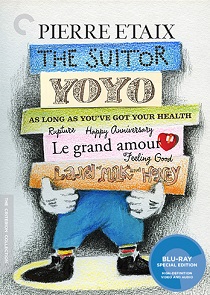 Leave it to the ambivalent gods of film licensing and legalities to relegate a unique cinematic talent to the backburner.
Leave it to the ambivalent gods of film licensing and legalities to relegate a unique cinematic talent to the backburner.
In this age of instant streaming video and constant re-issues of the same movies in different formats, it’s a rare feat to discover something that hasn’t been available for home viewing. It’s been 20 years since any of the works by French comedy master Pierre Etaix (largely unknown outside his home country and an early collaborator with Jacques Tati) have been on the market.
After years of various companies owning the rights and not doing anything with them, Étaix himself finally won a suit against the latest distributor, enabling him to reclaim ownership of his work with the support of a petition with 50,000 signatures that was sent to the French cultural minister. Janus Films recently restored the movies for an art-house theatrical run and the five feature films and three shorts by Pierre Etaix are out finally now on Blu-ray and DVD from The Criterion Collection.
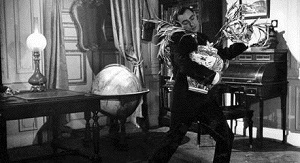 The Suitor is the first feature in the set, following the early shorts Rupture and Happy Anniversary (winner of the 1963 Oscar for Best Short Subject), which find Etaix developing his style: an almost wordless, deadpan comic delivery in the Buster Keaton vein and a deliberate pace that assured that his carefully planned gags came to fruition with a minimal amount of cutting. The Suitor is a delightfully droll comedy about a man who tries to find a beau because that’s what men are supposed to do. While pursuing this goal under duress, he actually falls in love with someone — or the image of someone. It is such a subtle movie that when his whimsical brand of satire switches targets, it isn’t perceptible until Etaix has moved on. In fact, The Suitor shows Etaix in such control that he welcomed the challenge of a new style the moment it was finished.
The Suitor is the first feature in the set, following the early shorts Rupture and Happy Anniversary (winner of the 1963 Oscar for Best Short Subject), which find Etaix developing his style: an almost wordless, deadpan comic delivery in the Buster Keaton vein and a deliberate pace that assured that his carefully planned gags came to fruition with a minimal amount of cutting. The Suitor is a delightfully droll comedy about a man who tries to find a beau because that’s what men are supposed to do. While pursuing this goal under duress, he actually falls in love with someone — or the image of someone. It is such a subtle movie that when his whimsical brand of satire switches targets, it isn’t perceptible until Etaix has moved on. In fact, The Suitor shows Etaix in such control that he welcomed the challenge of a new style the moment it was finished.
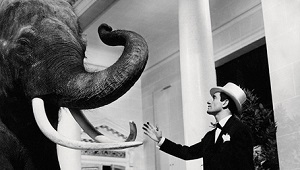 Since Etaix began his career as a clown (and returned to the circus again in 1971), 1965’s YoYo has a semi-autobiographical slant. It also has a welcome abstract sensibility (no surprise: Etaix had recently seen Fellini’s 8½) and features a narratively challenging structure. The first act of the film — featuring no dialogue but filled with exaggerated sound effects — has him portraying a comically spoiled rich man who yearns for a woman from his past. She shows up, and he discovers he has a kid. Fast forward 10 years. For the remainder of the film, Etaix now plays the kid. Certainly the kinship and familial structure of a traveling circus is put to good use in YoYo, but it’s also joyfully surrealistic, and contains his most inventive gags.
Since Etaix began his career as a clown (and returned to the circus again in 1971), 1965’s YoYo has a semi-autobiographical slant. It also has a welcome abstract sensibility (no surprise: Etaix had recently seen Fellini’s 8½) and features a narratively challenging structure. The first act of the film — featuring no dialogue but filled with exaggerated sound effects — has him portraying a comically spoiled rich man who yearns for a woman from his past. She shows up, and he discovers he has a kid. Fast forward 10 years. For the remainder of the film, Etaix now plays the kid. Certainly the kinship and familial structure of a traveling circus is put to good use in YoYo, but it’s also joyfully surrealistic, and contains his most inventive gags.
As Long As You’ve Got Your Health contains four 1966 short films, each stylistically diverse, and each using Etaix’s talented stock company. Part of the fun of watching this compilation, loosely held together by a couple similar themes (polite dissatisfaction being the main one), is recognizing faces from short to short. Etaix himself portrays a frustrated moviegoer at a cinema in one straightforward gag-filled short, when the program he’s watching becomes a grotesque parody of TV commercials. When the people break out from the ads but keep their trademark smarminess, Etaix seems truly angry for the first time. The next short continues the angry streak and employs some quicker editing techniques for a barrage of visual gags. Another short — Feeling Good — that Etaix cut from the theatrical run of As Long As You’ve Got Your Health is included as a bonus, but doesn’t quite have the same spark.
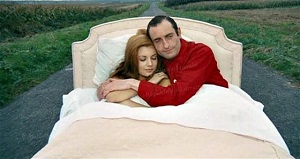 Etaix’s first all-color feature and last fiction film is 1969’s Le Grand Amour, and in keeping with his growth as a filmmaker, it has a different feel as well, jumping back and forth through time and dreams within the narrative. Essentially about a married man experiencing fantasies that bring new life to his marriage, it covers familiar territory but in a fresh way. The single most memorable image of the entire box set is from Le Grand Amour: Etaix and his young secretary in his bed whizzing playfully down the road past other beds, broken down, or in other states of disrepair. It should be noted that Buster Keaton’s Steamboat Bill, Jr. (1928) has a runaway bed scene also. Like most of the films in this collection, Le Grand Amour was co-written by Jean-Claude Carrière, who penned some of Luis Buñuel’s most well-known works, including the sexual daydream Belle du Jour.
Etaix’s first all-color feature and last fiction film is 1969’s Le Grand Amour, and in keeping with his growth as a filmmaker, it has a different feel as well, jumping back and forth through time and dreams within the narrative. Essentially about a married man experiencing fantasies that bring new life to his marriage, it covers familiar territory but in a fresh way. The single most memorable image of the entire box set is from Le Grand Amour: Etaix and his young secretary in his bed whizzing playfully down the road past other beds, broken down, or in other states of disrepair. It should be noted that Buster Keaton’s Steamboat Bill, Jr. (1928) has a runaway bed scene also. Like most of the films in this collection, Le Grand Amour was co-written by Jean-Claude Carrière, who penned some of Luis Buñuel’s most well-known works, including the sexual daydream Belle du Jour.
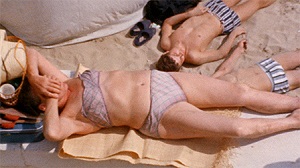 The final film in the Pierre Etaix Blu-ray and DVD set is the most bizarre. The Land of Milk and Honey, from 1971, is a both a social critique and a documentary that finds Etaix mostly offscreen interviewing loathsome French vacationeers who seem oblivious of their vulgarity, directly following the civil unrest of the failed student/worker strikes in May of 1968. Of course, Etaix uses a number of audiovisual juxtapositions to make them seem that way. At times, The Land of Milk and Honey feels like a more exploitative early Errol Morris film (think Vernon, Florida) crossed with a dark Coen brothers comedy.
The final film in the Pierre Etaix Blu-ray and DVD set is the most bizarre. The Land of Milk and Honey, from 1971, is a both a social critique and a documentary that finds Etaix mostly offscreen interviewing loathsome French vacationeers who seem oblivious of their vulgarity, directly following the civil unrest of the failed student/worker strikes in May of 1968. Of course, Etaix uses a number of audiovisual juxtapositions to make them seem that way. At times, The Land of Milk and Honey feels like a more exploitative early Errol Morris film (think Vernon, Florida) crossed with a dark Coen brothers comedy.
Criterion has also filmed new video introductions by Etaix to each film, and included a 2011 documentary about Etaix from his wife Odie Etaix. Etaix’s work is so alive and brimming with intelligence and humor that it would have been a shame to lose it. Criterion’s box set is a wonder, capturing it all in one great-looking, convenient spot for film fans everywhere.








Comments on this entry are closed.